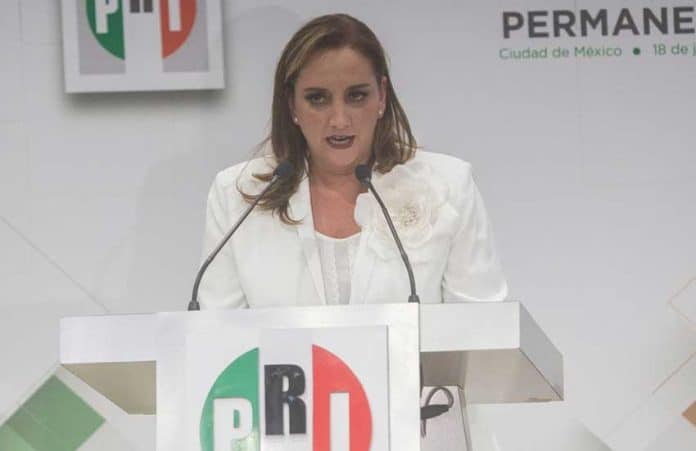Mexico’s ruling and once omnipotent Institutional Revolutionary Party (PRI) allowed itself to be “seduced by power,” its new national leader said yesterday during a scathing critique of the party’s crushing defeat at the July 1 elections.
Speaking after being sworn in as president of the party’s National Executive Committee (CEN) until 2019, former cabinet secretary Claudia Ruiz Massieu said voters had made a clear choice to punish the PRI by rejecting it at the ballot box last month.
“Not only did a new political force win, the balance of power — at all levels of representation and in practically the entire country — was also radically reshaped. The PRI will face a scenario that we have never experienced before: simultaneously being opposition to the [federal] executive and a minority party in the legislative power,” she said.
José Antonio Meade, the party’s candidate for president, won just 16% of the vote to finish third in the main race more than 35 points behind now president-elect Andrés Manuel López Obrador, whose party Morena dominated the elections.
President Enrique Peña Nieto’s administration has been plagued by corruption scandals, worsening levels of insecurity and slow economic growth, giving rise to a widespread appetite for change that manifested itself in a massive vote for López Obrador.
An open letter signed by hundreds of PRI members and published last month said that “President Peña and the top-level officials in his government, mainly those who have been in charge of combating insecurity and poverty and those who committed acts of corruption or should have been dedicated to eradicating it, are largely responsible for the electoral result.”
The PRI, which ruled Mexico uninterrupted for 71 years until the year 2000, also lost the nine gubernatorial contests that were held on July 1 and was even swept from power in municipalities where it had never lost before, such as Peña Nieto’s birthplace of Atlacomulco, México state.
“We didn’t know how to defend our party. We forgot our origins when we abandoned the political actions we were based on. We favored pragmatism over our principles. We let ourselves be seduced by power,” Ruiz charged.
“The decisions that belong to the membership of the party were closed off to the leadership. We got too close to the elites and distanced ourselves from the causes of the citizens. We spent more time in our offices than in the streets. We forgot that a [political] party promotes causes,” she continued.
“. . . We drifted away from the social reality, we lacked sensitivity, we allowed others to appropriate our colors, we lost our identity as the people’s party of Mexico.”
Ruiz, who served as secretary of tourism and secretary of foreign affairs at separate times in Peña Nieto’s administration before moving in to the PRI’s administrative apparatus as secretary general, also partially set out a path back to political relevance for the embattled party.
“To renew the PRI, just as important as taking decisions is to not evade responsibility. The duty of the new leadership is to speak bluntly, clearly and truthfully,” she said.
The party’s lawmakers will act as a “counterweight” to the incoming federal government and carefully watch the political decisions that affect the future of Mexico with a critical eye, Ruiz added.
She also said the PRI needs to do more to encourage the appointment of women and young people to leading roles within the party and to ensure that corrupt conduct of members is dealt with before it causes irreparable damage.
“We didn’t raise our voices in time to denounce and punish the corruption that was generated within our own ranks. We allowed the shameless and the abusive to stain the image and damage the reputation of millions of honorable, patriotic and hard-working women and men of the PRI.”
Source: SDP Noticias (sp), El Financiero (sp)
